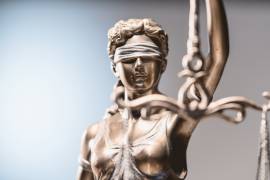
When Policing Makes Schools More Unsafe
Blog Search

Co-authored by Aisha Davis, Tyron Garner Fellow, & Christopher Clark, Counsel & Youth & Schools Program Strategist
Last week, the world watched in horror as a 16-year-old Black girl was thrown around a classroom by police Deputy Ben Fields, a white school resource officer stationed in Spring Valley High School.
During the interaction, the only person who could be heard standing up for the 16-year-old was another Black girl in the classroom. Following the incident, both girls were charged with “disturbing schools.” The day after cell phone video of the violent interaction surfaced, federal authorities began a civil rights investigation about the incident, and the following day, Dep. Fields was fired.
Lambda Legal continues to oppose systemic, identity-targeted brutality at the hands of law enforcement against children and young adults whose only “crime” is acting like a child or teenager. Too often, this violence is racially-motivated or motivated by animus against LGBTQ young people or both. And, too often, this violence takes place as young people are shuffled through the school to prison pipeline.
The schoolroom violence in this video was alarming and extreme. But, the current state of policing in schools has created a situation where harsh punishments for minor, nonviolent infractions have become all too commonplace. Unsurprisingly, students of color, LGBTQ students, and gender-nonconforming (GNC) students are disproportionately overrepresented on the receiving end of these severe disciplinary actions. Lambda Legal recognizes that the violence perpetuated against the young student in Columbia, South Carolina is endemic to a system that criminalizes our most vulnerable children.
The criminal charge against both girls – disturbing schools – is a misdemeanor offense that carries with it the potential for a fine up to $1,000 or imprisonment for up to 90 days. With such heavy consequences, one could reasonably assume that the offending behavior would have to be equally serious. Not so. This statute is so suspiciously vague that it allows school authorities, including officers like Dep. Fields, to levy this charge against students based on a claim that he or she “act[ed] in an obnoxious manner” on school property.
Broadly constructed laws that grant authorities this level of discretion place all children at risk of being criminalized for youthful behaviors. This level of discretion and latitude is particularly harmful for children of color, LGBTQ children, GNC children, and, especially, children living at the intersections of these identities because cultural currents of stereotype and bias that influence the application of these vague laws.
In its Black Girls Matter Report, the African American Policy Forum found that Black girls are suspended at a rate six times that of white girls, and that while 2% of white girls were subjected to exclusionary suspension, 12% of Black girls were. The Gay-Straight Alliance Network’s report on LGBTQ & GNC Youth of Color illustrates that LGBTQ and GNC youth of color face “persistent and frequent harassment and bias-based bullying from peers and school staff as well as increased surveillance and policing, relatively greater incidents of harsh school discipline, and consistent blame for their own victimization.”
This increased targeting by both peers and authority figures fuel the school to prison pipeline – into which children of color, LGBTQ children and GNC children are disproportionately overrepresented – through increased interaction with the juvenile justice system, resulting in school push-out.
The outrageous events of Spring Valley High School are part of a systematic problem. The Sentencing Project reports that although Black students make up 14% of the school population they comprise 40% of the youth in juvenile detention.
Additionally, last year, the Equity Project found that 85% of LGB and GNC youth in juvenile detention were youth of color. This same report found that 39% of LGBTQ youth experiencing homelessness “reported being involved in the juvenile justice system at some level.” The policies and regulations around school discipline and juvenile justice are not protecting our children – they are leading them out of the classroom and into the courtroom. Lambda Legal knows that we must work together to find practices that foster school environments that are safe for our most vulnerable students, and protect young people like these two students in South Carolina.
More information on Lambda Legal’s work for LGBTQ children, teens and young adults in schools, foster care, juvenile justice and homeless systems can be found at our Know Your Rights: Teens and Young Adults page.


